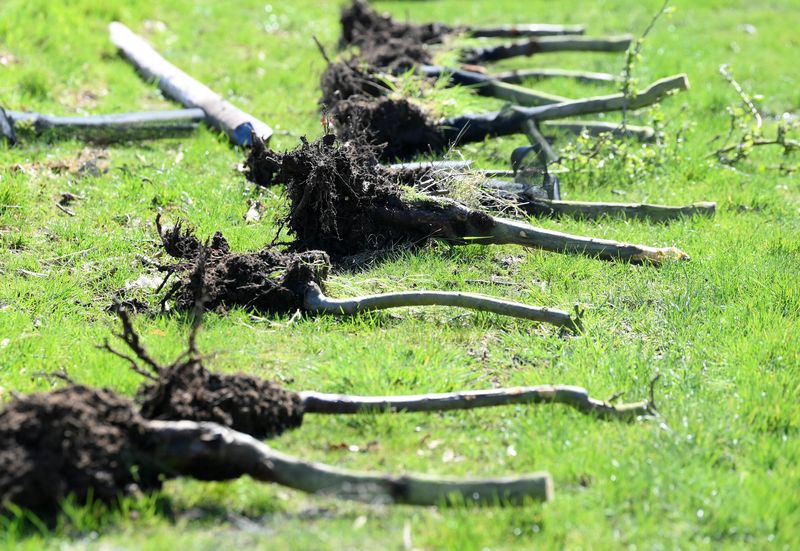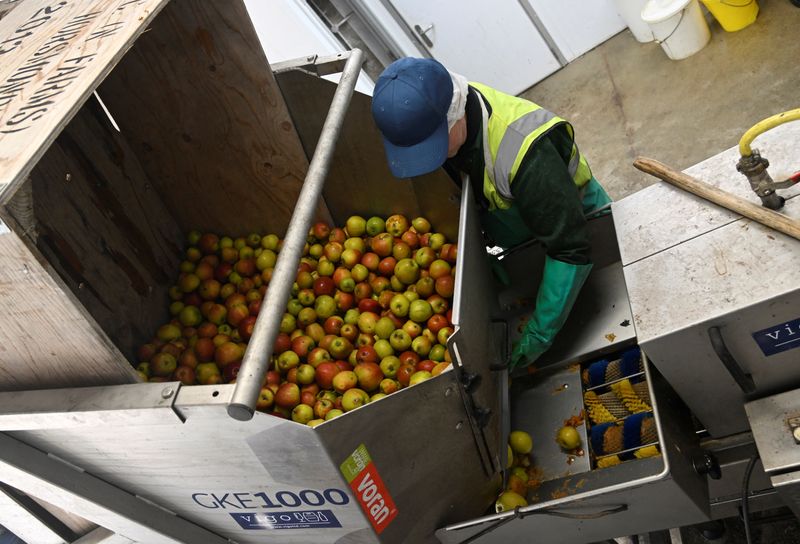By Sarah Young
LINTON, England (Reuters) - The stumps of dozens of apple trees lie discarded along the side of a field. The fruit that helped give the "Garden of England" its name hundreds of years ago no longer makes money so farmer James Smith is tearing down his orchards.
Shortages of tomatoes and cucumbers on Britain's supermarket shelves earlier this year turned the spotlight onto the country's food producers. For some of them, the ultra-competitive grocery market has gone too far.
"I don't really want to get rid of all of my fruit but I simply cannot see a way of overcoming all of the challenges," Smith said at his farm amid the rolling hills of Kent, southeast England, where his family have grown apples since 1882.
Turning a profit from selling red apples to supermarkets has been a struggle for years, he said. A more unpredictable climate has been compounded by the lack of labour to pick fruit in the years after Britain left the European Union. The surge in inflation over the last year brought the situation to a head.
For 2022's crop to break even, he said he needed supermarkets to pay him 20% more than the previous year for each giant wooden crate of apples. Supermarkets offered 0.8% more.
It was the final straw after years of losses.
"If I stop growing fruit I can make money," he said, explaining his plans to diversify away from apples by turning to livestock, a vineyard and shop.
Britain's fruit production has been in decline since 2015, according to government figures, and was down 12% in 2021 from the previous year. The United Kingdom imports about 85% of its fruit needs annually.
Supermarkets say they need to hold prices down for consumers, who are grappling with a cost of living crisis. Grocery price inflation stood at a record level of 17.5% according to the most recent industry data for March.
The British Retail Consortium, which represents supermarkets, said they source the majority of their food from the United Kingdom and know they need to pay farmers a sustainable price.
PROBLEMS FOR THE FUTURE
"Given the pressure on British farmers at the moment, retailers are paying more for their produce," BRC's Director of Food & Sustainability Andrew Opie said.
But Smith, who over the last decade said he has supplied all the big supermarkets, including most recently Tesco (LON:TSCO) and Aldi, via a partner group, said supermarkets do not pay enough.
"Retailers are completely committed to making sure we can't make any sensible profit, not even in the good years," said Smith, whose title is managing director of Loddington Farm.
By squeezing domestic producers so hard, he believes retailers are storing up problems for the future.
If other farmers like him stop producing at scale, Britain will be more reliant on imports and vulnerable to supply shocks.
For the farmers that stick it out, it will be a battle.
"Clearly a grower with no margins hasn't got the profits to invest back in the business," said Richard Napier, professor in plant and agricultural biosciences at the University of Warwick.
In Kent, Smith is removing 80% of his orchards. Last year growing apples lost him 150,000 pounds ($186,000), a loss which would have been higher had it not been cushioned by other income streams from his land.
Last harvest's Braeburn apples have not been sold. Wooden crates stacked eight high are loaded in a warehouse where they are kept at between 0.5 and 1 degree Celsius to keep them fresh and provide supply whatever the season.
That means big energy costs. Last October, Smith's monthly energy cost per kilowatt hour was 450% higher than the previous year. Labour costs were up 15%, while the price he paid for the wires and posts used to structure the orchards rose 15%.
Watching tree after tree being ripped out of the soil as most of his orchards are cleared, Smith said he had no time to be nostalgic as turning his back on commercial apple production was the best way to ensure his family's farm survives.
He's bought a juicing business for which he will continue to grow a small amount of apples. Pigs and chickens will be brought in to graze on the former orchards and there's a farm shop selling juice and other produce.

He's also planting a vineyard and is growing small amounts of cherries, the fruit which legend has it prompted King Henry VIII to first call Kent the "Garden of England".
Under Smith's plans, the garden lives on, but is producing less food than it once did.
